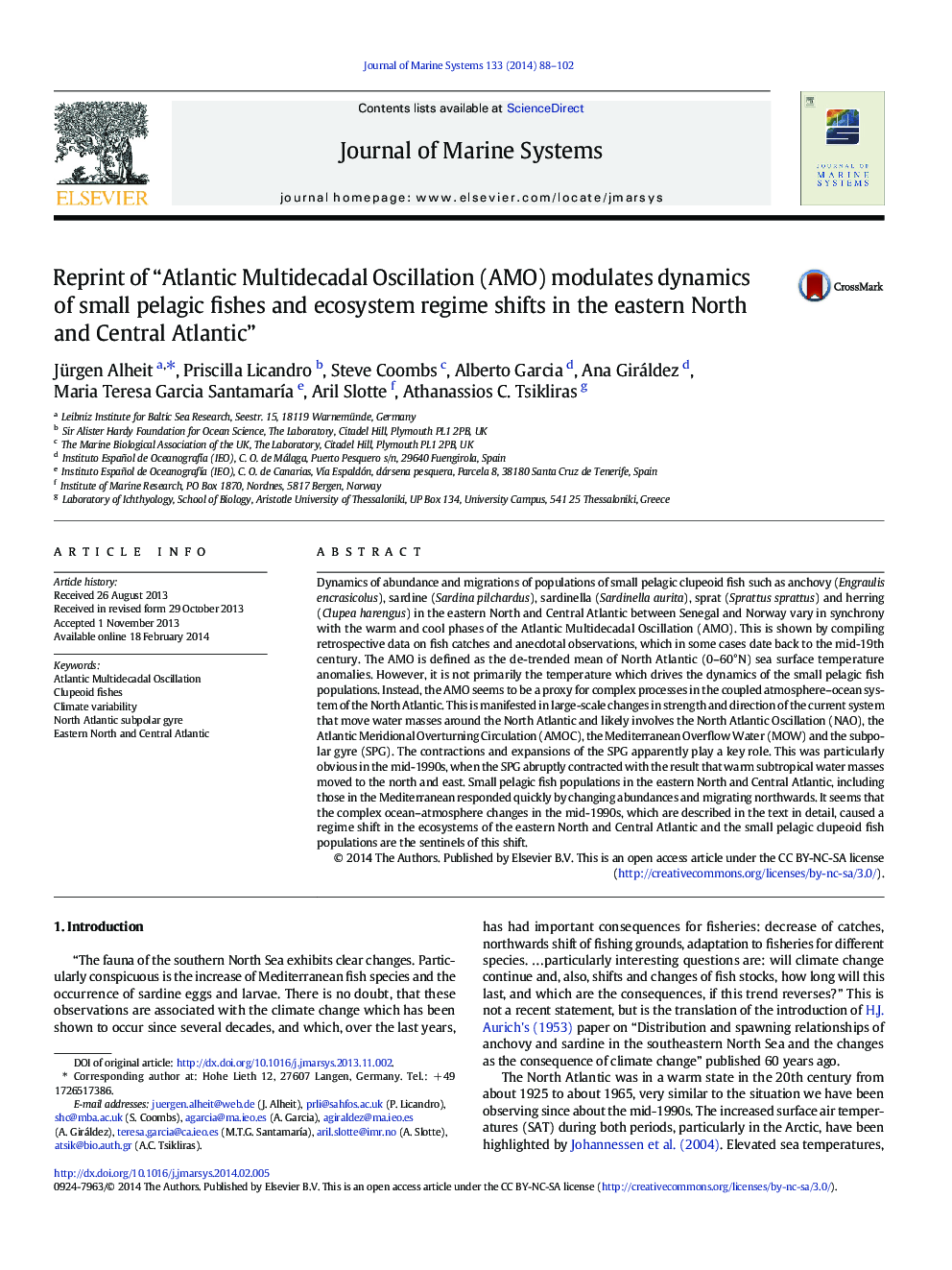| کد مقاله | کد نشریه | سال انتشار | مقاله انگلیسی | نسخه تمام متن |
|---|---|---|---|---|
| 6387008 | 1627296 | 2014 | 15 صفحه PDF | دانلود رایگان |
عنوان انگلیسی مقاله ISI
Reprint of “Atlantic Multidecadal Oscillation (AMO) modulates dynamics of small pelagic fishes and ecosystem regime shifts in the eastern North and Central Atlantic”
دانلود مقاله + سفارش ترجمه
دانلود مقاله ISI انگلیسی
رایگان برای ایرانیان
کلمات کلیدی
موضوعات مرتبط
مهندسی و علوم پایه
علوم زمین و سیارات
اقیانوس شناسی
پیش نمایش صفحه اول مقاله

چکیده انگلیسی
Dynamics of abundance and migrations of populations of small pelagic clupeoid fish such as anchovy (Engraulis encrasicolus), sardine (Sardina pilchardus), sardinella (Sardinella aurita), sprat (Sprattus sprattus) and herring (Clupea harengus) in the eastern North and Central Atlantic between Senegal and Norway vary in synchrony with the warm and cool phases of the Atlantic Multidecadal Oscillation (AMO). This is shown by compiling retrospective data on fish catches and anecdotal observations, which in some cases date back to the mid-19th century. The AMO is defined as the de-trended mean of North Atlantic (0-60°N) sea surface temperature anomalies. However, it is not primarily the temperature which drives the dynamics of the small pelagic fish populations. Instead, the AMO seems to be a proxy for complex processes in the coupled atmosphere-ocean system of the North Atlantic. This is manifested in large-scale changes in strength and direction of the current system that move water masses around the North Atlantic and likely involves the North Atlantic Oscillation (NAO), the Atlantic Meridional Overturning Circulation (AMOC), the Mediterranean Overflow Water (MOW) and the subpolar gyre (SPG). The contractions and expansions of the SPG apparently play a key role. This was particularly obvious in the mid-1990s, when the SPG abruptly contracted with the result that warm subtropical water masses moved to the north and east. Small pelagic fish populations in the eastern North and Central Atlantic, including those in the Mediterranean responded quickly by changing abundances and migrating northwards. It seems that the complex ocean-atmosphere changes in the mid-1990s, which are described in the text in detail, caused a regime shift in the ecosystems of the eastern North and Central Atlantic and the small pelagic clupeoid fish populations are the sentinels of this shift.
ناشر
Database: Elsevier - ScienceDirect (ساینس دایرکت)
Journal: Journal of Marine Systems - Volume 133, May 2014, Pages 88-102
Journal: Journal of Marine Systems - Volume 133, May 2014, Pages 88-102
نویسندگان
Jürgen Alheit, Priscilla Licandro, Steve Coombs, Alberto Garcia, Ana Giráldez, Maria Teresa Garcia SantamarÃa, Aril Slotte, Athanassios C. Tsikliras,